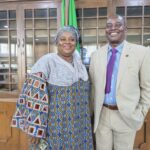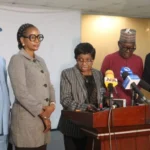By Perpetua Onuegbu
The Federal Government on Wednesday called for private sector investments in provision of affordable housing and urban infrastructure .
The Minister of Housing and Urban Development, Mr Ahmed Dangiwa, made the call in a Keynote address at an event to mark the World Cities Day in Abuja.
NAN reports that the day is an annual United Nations observance day held on Oct. 31 .
Dangiwa, equally called on international development partners and other stakeholders collaboration in that regard.
“We therefore call for private sector investments in the sector by leveraging on the Ministry’s Public-Private Partnership (PPP) arrangement already in place to mobilise financing for affordable housing and urban development,” he said.
The theme of the commemoration is ‘Resilient Urban Economies. Cities as Drivers of Growth and Recovery’ and Financing Sustainable Urban Future for All’.
Represented by the Minister of State for Housing and Urban Development, Alhaji Abdullahi Gwarzo,
Dangiwa said urbanisation had become one of the most transformative forces shaping our world in this 21st century.
“It is a phenomenon that can be harnessed to enhance economic productivity, inclusive growth, and environmental sustainability.
“Urban dwellers now account for more than 50 percent of Nigeria’s population and are expected to increase to 60 percent by the year 2030.
“It is our duty to make adequate preparations for the expected upsurge of population in our cities through effective urban planning management and building the needed resilience and innovation to absorb the expected shocks,”Dangiwa said.
He said the federal government was paying thoughtful attention to the issues and challenges of urbanisation in the country.
Dangiwa said the issue of financing for affordable housing and urban infrastructure remained the cardinal focus of the ministry and solicited for collaborations and partnerships from development partners and other stakeholders.
The minister added that as the world builds and consolidates the foundation of the New Urban Agenda, urgent steps were required to rectify past imperfections.
“We envisage an urban future where economic growth and prosperity proceed with equity; one where human exploitation of the natural environment is carried on sustainably; and one where poverty and inequality are attenuated by strong human centered policies.
“Over the years, I have realized that inefficient urbanisation resulting from lack of sustainable development financing can result in diseconomies of scale and negative externalities.
“Further exacerbating issues that contribute toward decelerating progress of achieving the SDGs, such as poverty, climate change, and pollution. The government alone cannot handle financing for housing and urban development.
In a virtual message, Antonio Guterres, the Secretary -General of the United Nations said governments organisations, the private sectors and civil society must work together to mobilise finance for resilient, sustainable cities.
Guterres said equitable financing solutions should be encouraged at a global level , in addition to innovative and diverse funding sources to strengthen local financing strategies that are climate friendly, inclusive and equitable.
Also speaking at the event a Professor of Urban and Regional Planning Prof. Davidson Alaci said a city could only be as resilient as the people that inhabit it.
Alaci said for a sustainable urban future for all, government must invest in urban land use planning for pro-poor economic turnaround.
“Urban land use planning can be harnessed to enhance urban competitiveness, improved financial resources mobilisation, improved access to urban basic services -targeting the poor.
“Well planned urban areas can be leveraged for more revenue generation, Lagos is a good example of resources mobilisation from urbanisation.
“This can be plough into improvement in quality of life and improved adaptation through the provision of urban basic services,” the expert said.
On his part, Sen. Gbenga Ashafa, the Managing Director of the Federal Housing Authority (FHA) said the government had to make concerted and deliberate effort at urban development, through building of new cities and regenerating of the old ones.
“Through this, not only will we provide houses to our people, we will also deliver more liveable and secure environment to them.
“More importantly, the value chain of the housing industry remains the surest bet of creating jobs, both directly and indirectly, employing both professionals and non-professionals.
“This will enable us to reinforce growth and recovery in our Urban Economies.” Ashafa said.
Mr Madu Hamman, Managing Director, Federal Mortgage Bank of Nigeria (FMBN) said urban cities are centres for economic growth and development but the inability for urban planning and infrastructure rollout gave rise to social challenges.
He said the bank plans to integrate the informal sector into the National Housing Find(NHF) to tackle some of these challenges.
“This would widen the door of opportunity to over 85 per cent of the Nigerian population that is currently neglect or ignored.
“Another significant development is its intention to scale up to providing housing from estate to city level,” Hamman said.
NAN reports that the World Cities Day was established on Dec. 27, 2013 by the UN General Assembly in its resolution A/RES/68/239, in which member states decided to designate 31 October, beginning in 2014, as World Cities Day.
The day serves as an opportunity to promote the international community’s interest in global urbanization, push forward cooperation among countries in addressing challenges of urbanization and contribute to sustainable urban development around the world.
The Global Observance of World Cities Day, under the theme Financing sustainable urban future for all, will explore how we can unlock transformative investment in urban planning and achieve adequate fiscal decentralisation. (NAN)(www.nannew.ng)
=======
Edited by Sadiya Hamza












